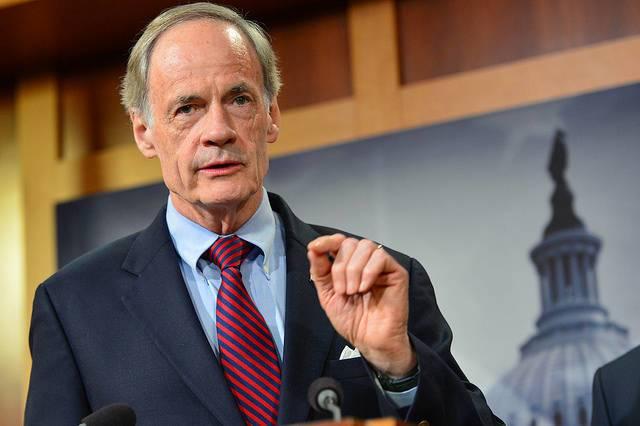
Senator Tom Carper (D-Del.) has a few probing questions for Environmental Protection Agency Administrator Scott Pruitt these days. And with the recent explosion at the Crosby, Tex. Arkema plant, it seems that list is getting much longer.
Last week, while Hurricane Harvey was pummeling the Texas coast, the Arkema chemical plant, which stores volatile substances like organic peroxides under refrigeration, lost power. Although the cause of the explosion is still being determined, there’s been some question as to whether the plant was up to date on its risk assessment protocol and whether it should have had a back up system in place to ensure the chemicals didn’t lose refrigeration.
Worse, is the fact that nearly a week later, authorities still do not have a complete list of the chemicals that are on site, or what the concoction of fumes was that police officers were inhaling when they arrived at the explosion. Fifteen officers were subsequently sent to the hospital for inhaling toxic fumes.
Carper, who has been fairly critical of Pruitt’s plan to downsize the EPA’s role in regulating industries like chemical manufacturing plants, had investigators quickly assess what backup procedures were in place when the power went down. Carper is one of the top Democrats of the Senate Committee on Environment and Public Works, which has direct oversight for the EPA.
It seems investigators had some help in finding a track record record to follow, because Arkema already had a history of Occupational Health and Safety violations on file, many of which were rated by OSHA as “serious.”
In 2016, the plant was fined more than $91,000 for a variety of issues, including insufficient equipment testing and failure to maintain equipment safety systems. All of the violations were supposed to have been fixed last year, so it isn’t clear whether any of the violations played a role in this year’s systems failure.
But investigators did figure out that both the emergency generators and the additional back-up cooling systems that were in place had failed during the flooding last week. And that’s now leading to questions about whether the plant was receiving regular inspections as it should have under Pruitt’s administration.
Pruitt isn’t exactly known these days for being forthcoming when it comes to his plans for the EPA. But his admission in April at the Harvey Coal Mine in Sycamore Penn. that he planned to return the EPA “back to basics” by cutting EPA programs has stoked concern for many environmentalists and put lawmakers like Carper on edge. President Trump’s proposal to cut funding for Risk Management Plan program by more than a third in 2018 has prompted concern that communities could be at risk if back up systems failed in a disaster as it did in Crosby.
Pruitt has also been taken to task for a number of statements he’s made about climate change and the environment in the past few years.He also recently lost an appeal to delay the enforcement of the Obama-era Methane Rule, one of several of rules that the Trump administration wants to halt, but has been unable to do in court.
These battles have also helped galvanize the attention of critics who are also concerned about the role of an administrator that doesn’t believe action needs to be taken to combat global warming or protect endangered species.
So Carper has forwarded a letter to Pruitt with six key questions about the EPA’s current and future role in factories like Arkema. It’s fairly clear by their tone that Carper isn’t looking for answers about how the explosion occurred as much as how Pruitt’s EPA will function in oversight now that it is clear that environmental disasters, such as what happened in Crosby, can happen.
In light of this incident, do you continue to support the President’s FY 2018 proposed 35 percent reduction in funds for the Risk Management Plan program? If so, why? If not, why not?
“In light of this incident, do you continue to support the two-year delay in the implementation date of the update of the Risk Management Rule you recently promulgated, and if so, why?
For its part, Arkema, which operates more than 25 chemical facilities across the US. has published a statement on its Crosby, Tex. website page, stating that the facility “produces liquid organic peroxides that are used primarily in the production of plastic resins, polystyrene, polyethylene, polypropylene, PVC and polyester reinforced fiberglass, and acrylic resins.” It states that it has had “one lost time injury in 7 years (it didn’t specify when that happened)” and that it keeps up-to-date with the EPA’s requirements for air pollution control.
It has not explained why the back-up equipment, designed to take over in the case of a failure, did not operate.
So far, there’s been no response from Pruitt or from President Trump as to whether they will revise their plans to downgrade regulatory oversight of high-risk industrial manufacturers like Arkema.
But you can bet Sen. Carper will be waiting to hear their answers
Images: Flickr/The Texas National Guard; Flickr/Senate Democrats
Jan Lee is a former news editor and award-winning editorial writer whose non-fiction and fiction have been published in the U.S., Canada, Mexico, the U.K. and Australia. Her articles and posts can be found on TriplePundit, JustMeans, and her blog, The Multicultural Jew, as well as other publications. She currently splits her residence between the city of Vancouver, British Columbia and the rural farmlands of Idaho.














